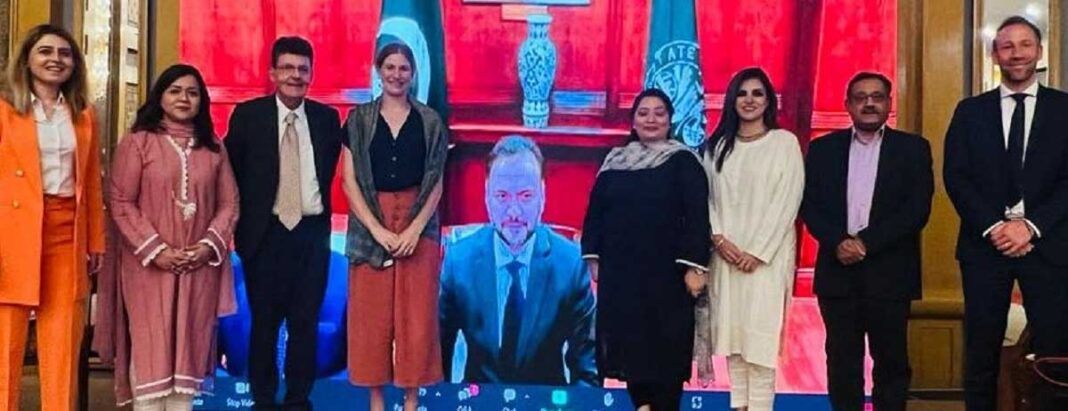
Staff Reporter
KARACHI: A capacity building workshop on green Finance organized by Sustainable Development Policy Institute (SPDI) and GIZ (German Cooperation) on Tuesday at a local hotel of Karachi. Special assistant to Prime Minister Romina Khursheed, Acting Governor State bank of Pakistan Syed Murtaza and other development sector experts attended.
It is imperative to mobilize multiple green finance options, especially private sector finances, to support Pakistan in achieving the Nationally Determined Contributions (NDCs) in terms of reduction in carbon emissions by 2030, said the experts at a workshop for Implementation of Green Financing Mechanisms in Pakistan.
Speaking at the workshop, Special Assistant to the Prime Minister and Convener Parliamentary Task Force on SDGs, Romina Khursheed Alam said that although the COVID-19 emerged as an unprecedented challenge for the international community but it also opened a window of opportunity for green recovery and green financing and realigned the commitment to Sustainable Development Goals. She further said that Pakistan’s progress towards clean energy transition is relatively slow especially in context of the unsustainable high fuel import prices. She urged the need for research support for parliamentarians so they can take up informed deliberations and debates to positively influence the policy making process.
Antonia Peters from the Germany Embassy in her welcome remarks expressed that Germany is keen on supporting Pakistan in achieving the Nationally Determined Contributions by mobilizing resources as Pakistan only has 50% of the required financing capacity. She pointed out the immense potential and interest in green financing investments in Pakistan as the green bond issued by Pakistan is oversubscribed in the global market.
Dr Abid Suleri, Executive Director Sustainable Development Policy Institute, in his welcome remarks said that in the midst of the economic meltdown, green financing is a viable mid to long-term investment opportunity to support economic growth in the country.
Dr. Murtaza Syed, Acting Governor, State Bank of Pakistan said that the central bank is actively trying to explore the international financing opportunities like Sustainable Banking and Finance Network and Network for Green Financing System. At the domestic level, SBP is promoting green financing by providing financing guidelines and regulatory frameworks.
Sebastian Jacobi, the Country Director KfW urged to adopt just transition policy in Pakistan as practiced in Germany and to tax import of fossil fuels to reduce reliance on carbon intensive energy. He pointed out that Germany, GIZ and KfW are providing 400 million euros to Pakistan to support the clean energy transition.
Achim Deuchert, Green Finance Advisor, GIZ said that Asia has become the largest economic zone with 80% of infrastructure responsible for 54% of the global carbon emissions. He highlighted the significance of private sector funds by saying that the private sector has five times more funds available and the green assets make up 35% of the global assets.
Speaking at the technical session, Roberto Aparicio from EU Delegation to Pakistan said that the EU is decreasing the imports from carbon intensive markets by increasing taxation compared to green manufacturing markets. He said that the EU delegation has earmarked 53 million euros to counter the risks associated with green investment in Pakistan and provided guarantees so foreign investments can be attracted in this sector.
Dr. Barbara Berkel from KfW Headquarters, Mushtaq Ahmed Memon, Project Manager, UNEP, Najia Ubaid, Additional Director, SECP, Ahmed Saeed, Head Social and Environmental Policy, HBL, Dr. Sajid Amin, Deputy Executive Director, SDPI, Waqar Ahmed, CEO Core Alliance, Head of Corporate Affairs & Sustainability and Prof. Dr. Fakhara Rizwan, Company Secretary, Chief legal & Corporate Affairs Office, Pakistan Stock Exchange also participated as panelist.
While in the last session Bilal Anwar, CEO National Disaster & Risk Management Fund highlighted the importance of the role of climate risk insurances and the need of the hour to bridge the financing gaps.






